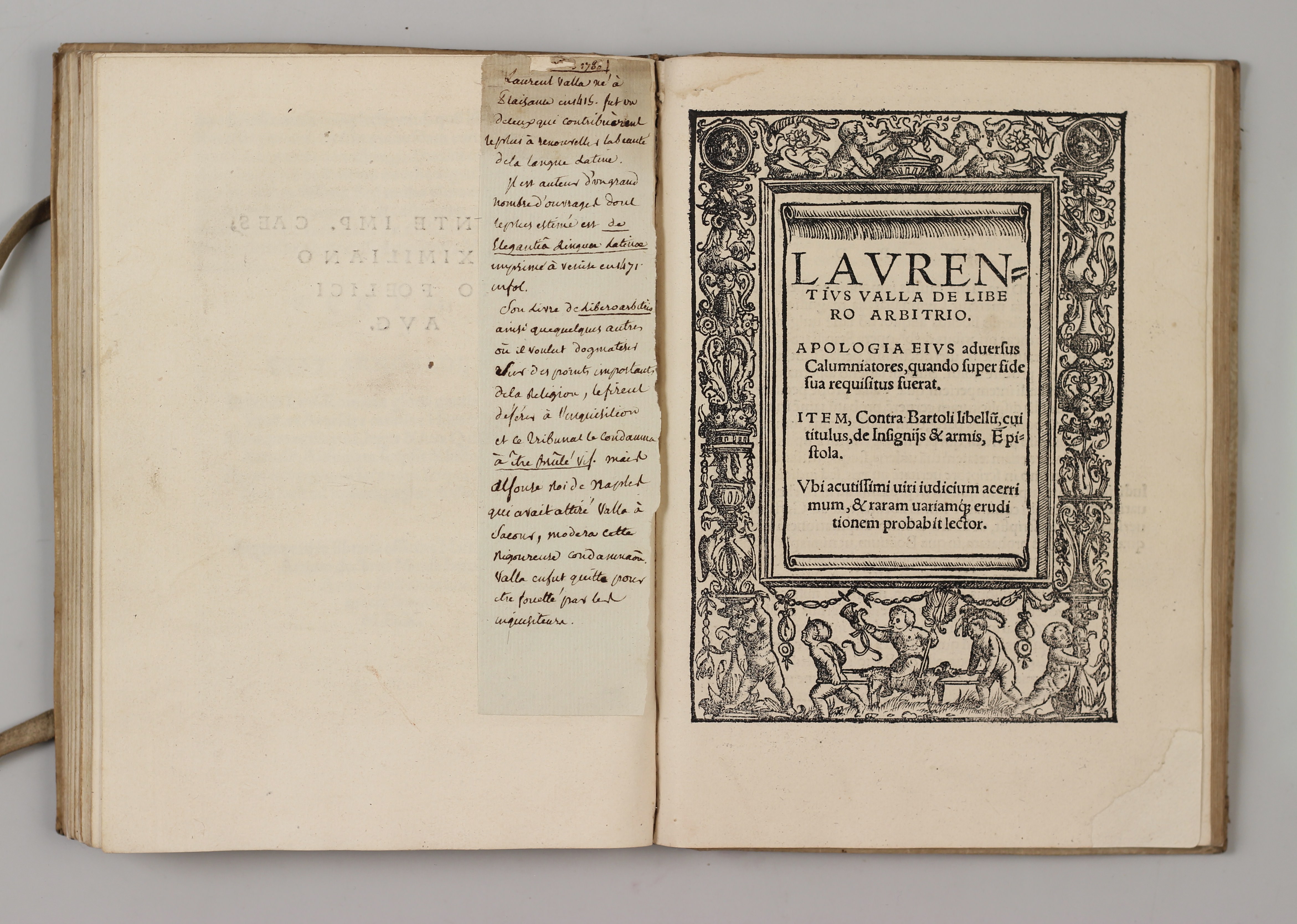Valla, Laurentius / Pomponius Laetus
De libero arbitrio / Opera
2.400 €De libero arbitrio. Apologia eius adversus calumniatores, quando super fide sua requistius fuerat. Item, Contra Bartoli libellum, cui titulus, de Insignijs & armis, Epistola … [Ed. Joachim Vadianus]. — Basel, Andreas Cratander, November 1518.
4to (204 x 145 mm). a-g4 h6: (34) leaves. Woodcut border on title-page. Contemporary vellum. Small piece torn from blank lower corner of the title-page. d2 (Apologia)with restored tear, d4 with a small hole and loss of some letters. A few old underlinings. – VD16 V 225; Adams V 4146. Bound before:
Pomponius Laetus, Julius
Opera. Romae historiae compendium, ab interitu Gordiani Iunioris usque ad Iustinum tertium. De Romanorum magistratibus. De sacerdotijs. De iurisperitis. De legibus ad M. Pantagathum. De antiquitatibus urbis Romae libellus, qui Pomponio adscribitur. Epistolae aliquot familiares. Pomponij vita, per. M. Antonium Sabellicum. — Strasbourg, Mathias Schürer, January 1510.
A2 B8C4 D8 E4 F8 G8 H4 I8 K4 L4 M8: (2), LXVII, (1) leaves. – VD16 V 158; not in Adams.
Provenance: Exlibris Bibliothèque de Mr. Braley des Varannes on paste-down. Late 18th century notes on a paper strip tipped in at the beginning of each work.
On the editor of De libero arbitrio Joachim Vadianus see Bietenholz, Contemporaries of Erasmus, III, 364f. Vadianus has edited the same compilation in Vienna, printed by Singriener and others in 1516.
¶ Lorenzo Valla (1407-1457) was one of the most important humanists of his time. His main works are De voluptate, a dialogue of representatives of Epicureism, Stoic, and Christian philosophy of morals, in 1519 also published by Cratander, Dialecticae libri tres, a radical refutation of scholastic logic and philosophy, De elegantiis linguae latinae, which reached some 80 printed editions until 1600, the exposure of the Donation of Constantin as a forgery, titled De falso credita et ementita Constantini donatione declamatio, the path-breaking annotations on the New Testament, edited by Erasmus in 1505, and the present dialogue on free will (Breve dicam, multo sunt plura quae ignorantur. 4v).
Its first edition was published in Cologne in 1473: Dialogi decem variorum auctorum, a compilation of several very different authors. A separate edition followed in Strasbourg in 1474, then Cologne 1482, printed together with his bestseller Elegantiae linguae latinae, Louvain 1483, together with De vero bono, and Vienna 1516. It has been intensively discussed from its first appearance in manuscript to Leibniz’ Theodicee. The following work Apologia, pro se, et contra calumniatores is written against the accusation of heresy, and it is dedicated to his friend Petrus Candidus Decembrius. The last tract attacks the celebrated 14th-century lawyer Bartolo da Sassoferrato not only because of his barbarous Latin, but primarily because of his incapacity to understand the historical background of law. The law faculty at Pavia took offense, and Valla found it expedient to leave – in France Valla’s critique of the contemporary jurisprudence led to the new mos gallicus. And even more than this, it prepared the foundation of philological and historical method.
E. Keßler, Editor of the Latin-German edition of the dialogue (München 1987), summarizes the philosophical achievement of Valla’s dialogue by having shown, that the problem of free will can not be discussed without considering historical conditions and prejudices, and that it is bound to preliminary decisions, which not to take into consideration would mean to escape in empty concepts, like Boethius did: “sed ad quasdam res confugiat imaginarias et commenticias.” (5r)
„Lorenzo Valla’s work De libero arbitrio begins the theoretical discussion of the freedom of the will … For the first time since antiquity, the problem of freedom is taken before an entirely secular forum, before the bench of natural reason … Valla created that form of dogma-criticism used in the seventeenth century by Bayle and even in the eighteenth century by Lessing. (E. Cassirer, The Indivual and the Cosmos in Renaissance philosophy, p. 79ff.)
Pomponio Leto’s Opera fits perfectly to Valla, since Pomponio (1428-1498) studied under Valla in Rome. „He soon became the centre of an intellectual circle later known as the Roman Academy. Originally a spontaneous and often lighthearted group of intellectuals, most of whom had ties to the papal court, the Academy devoted itself to literay discussions, archaeological excursions, and eventul the production of Roman plays and a more formal corporate life. Beginning at about 1465, Pomponius taught rhetorics at the Studio of Rome but was dissatisfied with his salary and determined to leave the city in 1467, going first to Venice, with the intention of embarking on a long voyage to the east […] In 1470 he returned to teaching rhetorics at the Studio of Rome. […] He is responsible for editions of several Latin authors and commentaries upon them, including Nonius Marcellus, Festus and others […] The most important work of his later years concerned the historical sources and the antiquities or Rome […] As a historian and antiquarian he became the most important continuator of Flavio Biondo’s work. (Bietenholz, Contemporaries or Erasmus III, 110).



